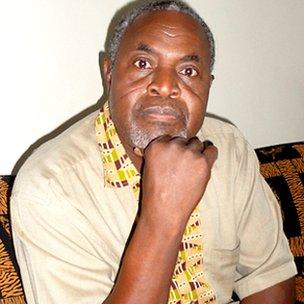Is Africa on trial?
- Published
The International Criminal Court (ICC) was set up to try those responsible for the most serious crimes in the world - such as genocide, crimes against humanity and war crimes.
So far, all 24 people facing charges - and the only person convicted - are from Africa, leading to accusations of bias. The African Union has said members countries should stop cooperating with the Court.
We asked two experts whether Africa is on trial.
YES

Mr Yeebo says that the ICC trials are designed to target the leaders who have offended powerful western interests
Zaya Yeebo is a writer and commentator on Pan African Affairs.
There are 15 cases currently before the International Criminal Court. All of them are against Africans. There is every indication that the ICC is targeting African leaders, working to a script written in Washington, Paris and London.
The former President of Ivory Coast, Laurent Gbagbo, was "abducted" at midnight and secretly carted off to The Hague. Liberia's former President, Charles Taylor, is still incarcerated at the ICC [he is being tried by the Special Court for Sierra Leone]. Sudan's head of state, President Omar al-Bashir, has been indicted. Muammar Gaddafi's son Saif, and Libya's intelligence chief were indicted before the court could even establish the nature of their crimes. The trend is easy to spot.
It is indisputable that some of these men were behind untold suffering. Their actions cannot be defended or denied. But this list of people suggests African leaders are the only ones imprisoning, torturing and murdering their citizens. They are clearly not. But no-one else is on trial.
When American staff sergeant Robert Bales allegedly shot dead 16 civilians in Afghanistan, including nine children, he was quietly spirited away to a military prison in the US, despite the demands of Afghan President Hamid Karzai to try him in the country where the massacre took place.
Had Mr Bales been an African, his commander-in-chief - although thousands of miles away - would have been subjected to the ICC's Rome process. But the idea that US President Barack Obama would be put on trial for crimes in Afghanistan is absurd. Yet senior Kenyan officialsare being held responsible for the deplorable actions of men who were not even taking orders from them.
The reason is simple: "[Lead ICC prosecutor, Jose Luis Moreno Ocampo has] avoided situations where he would likely step on the toes of permanent members of the UN Security Council, from Afghanistan to Gaza, to Iraq, to Columbia," argues international human rights law expert William Schabas, chairman of the Irish Centre for Human Rights at the National University of Ireland, Galway.
'Charade'
Politicians, activists and lawyers have desperately tried to bring horrific crimes from other parts of the world to the ICC's attention, but the court seems to actively avoid their pleas for justice.
The worst thing about the entire process is that the human suffering that inspired the creation of the court is irrelevant when it comes to who gets prosecuted.
The American ability to dictate the court's agenda was not at all diminished by the fact that the US refused to ratify the Rome Statute creating the court, meaning no American is subject to the court's authority.
African states, by contrast, signed up to the Rome Statute as equal partners.
But when the African Union - which knows a little more about African affairs than some American diplomats - tries to advise the court, it is systematically ignored. This attitude tells you everything you need to know about the ICC.
The trials are nothing to do with seeking justice for the hundreds of thousands of wronged people.
They are designed to target the leaders who have offended powerful western interests enough to earn the court's attention. If African "warlords" have western friends, they are ignored.
Col Gaddafi's son did not start abusing his power in 2011. But that is when western politicians decided to stop feting him, and the ICC decided he was a criminal.
Similarly, Mr Taylor is in The Hague because he had a spat with American diplomats. The crimes he is being accused of are simply an afterthought. It's a charade.
There is an Akan saying: "Megyefo de abaa tare me so", which means "My redeemer has turned my persecutor".
The International Criminal Court is in fact a pathetic continuation of an imperial tradition, a way for western powers to pretend they are protecting human rights in Africa, that they are teaching Africans right from wrong.
It is time Africa's criminals were held to account by Africans.